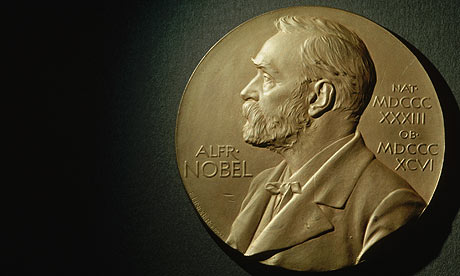World peace is a complicated construct. It's shaped by what we think we have learned from history. It's a noble aim for anyone who tries to achieve it. We know that human nature will always stand in the way of those who want to make this a better world. There are tools that can help facilitate the path to peace, though; one of them is the Internet. That's what the people behind the 'Internet for peace' initiative proclaim. They think the Internet should receive the Nobel Peace Prize 2010 — on behalf of all unknown helpers.
Before we examine the possibility of a Nobel for the net, we must ascertain whether the World Wide Web really is a realizer of peace. What is possible online is limited by what people make possible. On the Internet we can read news, and follow unfolding stories in real-time; we can play games, watch videos on YouTube and on Twitter we can see what others are doing. All this has a real-life merit, though. On many occasions young people in countries where freedom of speech is a commodity not yet shared by many, used the Internet to vent their distrust and dislike of their respective governments.
It's hard to apprehend that some people aren't able to browse the Internet freely, or acquire knowledge at will. They cannot visit a website of their choosing if the government deems it inappropriate. In the face of such tyranny, our routine of doing research online, without restrictions, feels like a privilege. One begins to wonder why freedom still is something that kindles conflicts among humans. Those who have brothers or sisters, remember how you bickered over trivial matters. Quarreling over natural resources or the supremacy of a state is principally the same. Someone always wants to be the one in charge, the king of the hill, subjugating everyone who thinks otherwise.

Image Credit: Flickr
Community prowess is one of the strengths the Internet has developed in recent years. This includes the easy reconnecting with long-lost friends on Facebook or similar services; however, the Internet is a platform for discussion, giving opportunity to those who could otherwise not speak freely. Some of the ideas and visions circulating online are preposterous, but some can inspire. Those are written and considered by individuals who share an urge for righteousness.
"Digital culture has laid the foundations for a new kind of society. And this society is advancing dialogue, debate and consensus through communication. Because democracy has always flourished where there is openness, acceptance, discussion and participation. And contact with others has always been the most effective antidote against hatred and conflict." With these words the 'Internet for peace' initiative states its vision. It's based in facts, to be sure, but it's half the story. Since it's not the Internet that aids world peace, however, it's the people who use the Internet to pursue higher ideals. Online communities are becoming a medium of choice to digest ethical, political and social issues. As such the net enacts the ideals of moral betterment individuals under pressure quest after. This is why the Internet is a lawful force.
Yet it's not my field of expertise, so I won't try to illustrate how the Internet can alleviate political ramifications. As someone who uses technology on a daily basis, I do know how it helps understand how society works. Computers in general offer a stage that prompts creativity, as much as it does sentiments of urgency. When I turn on my computer I sometimes wonder whether I can contribute to human lore. Just by surfing the Internet I can't.
A Nobel Prize is the highest-possible award for those who contribute greatly to humanity. Whether it was in the field of economics, physics or literature, past laureates have spread ideas that pushed the human race forward. Has the internet done enough to receive such a prestigious accolade? Any answer to that question is subjective. No one person uses the Internet the same way. Everybody reads different blogs, and watches different videos on YouTube. Not everyone uses the Internet to cry out for freedom.

Many would surely deem a Nobel Peace Prize for the Internet premature — if not entirely inappropriate. It could be seen as an overarching commemoration of those to whom the Internet is a measure of last resort. 70 years ago, in Nazi Germany, people didn't have the possibility of telling the truth. It's in dark times especially that we long for a vehicle to carry our feelings into the world. The internet can do that. Before the Internet there were only newspapers and newscasts in cinemas; people read what high commands had authored. Nowadays the public can interact with newspapers, blogs and websites. It's no longer a one-way trafficking of information. At all times someone somewhere has something worthwhile to share. Only a few strive to miff others; while a few select truly aim to inspire.
"Peace is unstable where citizens are denied the right to speak freely or worship as they please; choose their own leaders or assemble without fear. ... A just peace includes not only civil and political rights...it must encompass economic security and opportunity. For true peace is not just freedom from fear, but freedom from want." This is just a brief excerpt from President Obama's openly liberal acceptance speech in Oslo, Norway on December 10th, 2009. He put in words so eloquently what some wish for and die for. He also says, "I cannot argue with those who find these men and women -- some known, some obscure to all but those they help -- to be far more deserving of this honour than I."
It's easy to coat Earth's problems in eloquent, almost poetic, streams of thought. Does this help solve the addressed issues? No, it doesn't. While on the hand, it does offer leverage; a way to levitate the global awareness of anxieties troubles such as hunger and poverty cause. Some politicians sit in their high castles, looking down on their minions, like kings of yore. Online the people can speak their mind, though; regardless of nationality, belief or faith. Online everyone is truly equal, if not made equal by anonymity. Should one have to compromise one's self-image to be able to speak freely?
World peace is a game; it's possible to umpire a team of goodwill ambassadors, like a team of quarterbacks and wide receivers. Combating evil so that humanity can prevail in tranquillity is like confronting an opponent over a chessboard — intentions are out in plain sight, but only the mindful will notice the ulterior motives. Freedom of speech also implies deliberate actions. So, in a metaphoric sense every peace keeper belongs to a team. All those who fight to defend ideals of righteousness, devoutness and dignity, are arbitrators of justice too. The Internet is a bit like an ocean; it can't and shouldn't be moderated by any institution. Baggage doesn't belong in tomorrow's information networks.
Understanding is a key to success. Strong communities build substantial databases of information. Knowledge of economic and social concerns doesn't suffice, but with the help of technology we can determine the parameters by which peace becomes more practical. To some it may be nothing more than an abstract concept, hard to grasp or to put in perspective.

Image Credit: Flickr
The Bill and Melinda Gates Foundation advocates better equipped schools and libraries. For Bill Gates a library is the local centre for gathering and learning, and it should also be the hub for international communication in developing countries. With Microsoft he helped usher in the mainstream use of computers and software. Now he hopes to achieve similar triumphs in global health. A healthy community is as important as having healthy people to populate it. These are the base requirements for intellectual equality; a lack of it leads to conflict.
"In the year 2525" ends with a verse, which adequately captures in words one big dilemma humanity faces. "Now it's been 10,000 years, Man has cried a billion tears, For what, he never knew, Now man's reign is through," Zager and Evans sang in 1969 — the same year Neil Armstrong walked on the moon. Rarely any person is willing to step forward to take the blame for something they may not have done. Peace isn't abstract, it's a longing humans have had since the dawn of time. Today we have great opportunity to grant everyone's most-wanted wish. It's no coincidence that in 1776 the United States Declaration of Independence declared that every man, woman and child should have the right for "life, liberty, and the pursuit of happiness". In my own country, Germany, the first point of constitution is that human dignity is unassailable. Unfortunately, these rights are not upheld in every corner of the world.
The Internet doesn't offer hope, or a solution. It simply is a means to an end. Globalization spreads speedily, and the Internet makes it possibly to engage with the world without having to fear loss of one's personal identity. If a recently elected president can be awarded the Nobel Peace Prize in anticipation for great deeds yet unrealized, then the Internet can also be rewarded for kindling an urgency for action.
















22 Comments - Add comment